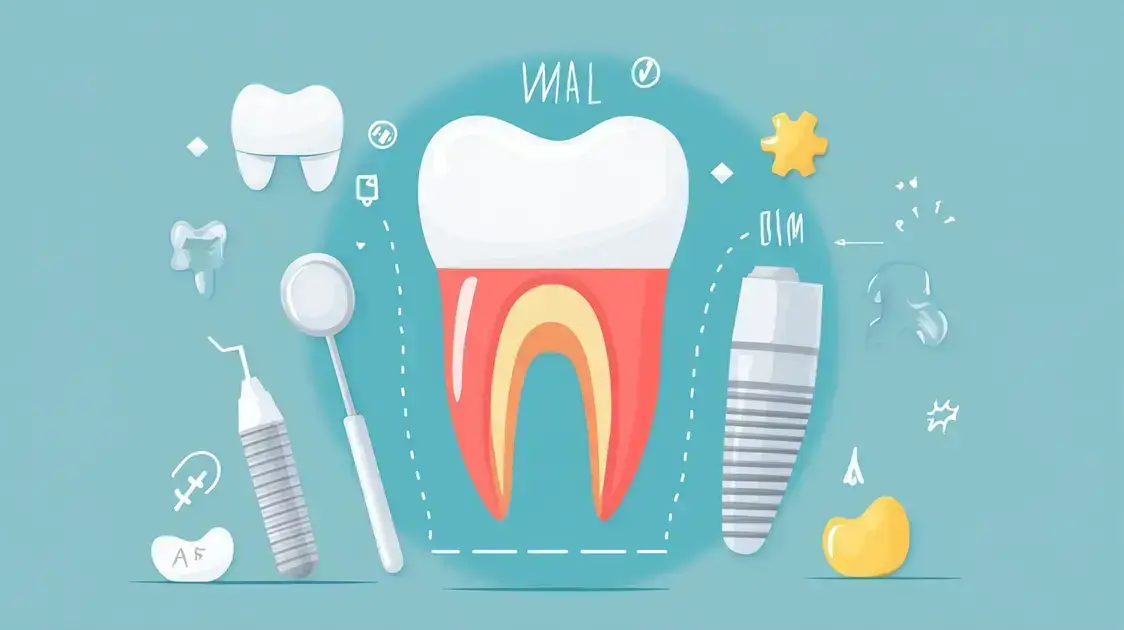How to Get Dental Implants Covered by Medical Insurance can be tricky, but it’s possible with the right approach. While many plans don’t cover implants, some do if they are deemed medically necessary.
To maximize your chances of coverage, it’s important to understand your policy and what qualifies as medically necessary.
Keep reading to discover the steps to take and how to increase your chances of approval.
Understanding Dental Implants
Understanding dental implants is crucial for anyone considering this dental procedure. Dental implants are artificial tooth roots made from durable materials like titanium.
They are surgically placed in the jawbone to support replacement teeth or bridges. Implants are known for their natural look and feel, making them a popular choice for those with missing teeth.
The Structure of Dental Implants
A dental implant consists of three main parts:
- Implant: The base, which is embedded in the jawbone.
- Abutment: The connector that holds the crown securely on the implant.
- Crown: The visible part that resembles a natural tooth.
Benefits of Dental Implants
Dental implants offer several benefits:
- Improved Appearance: They look and feel like natural teeth.
- Enhanced Comfort: Unlike removable dentures, dental implants are permanent.
- Better Oral Health: Implants do not require altering other teeth, preserving your dental structure.
- Durability: With proper care, implants can last a lifetime.
The Procedure for Getting Implants
The process for getting dental implants typically involves multiple steps:
- Initial Consultation: A dental professional evaluates your mouth and discusses options.
- Surgery: The implant is placed into the jawbone under local anesthesia.
- Healing Period: This allows the jawbone to fuse with the implant.
- Placement of Abutment and Crown: Once healed, the final restorations are attached.
Understanding dental implants allows individuals to make informed decisions about their oral health. If you’re considering implants, talk to your dentist about the options and what to expect during the procedure.
Do Medical Insurance Plans Cover Dental Implants?
Do medical insurance plans cover dental implants? This question is common among patients considering dental implants. The answer is not straightforward, as it depends on several factors such as the specific insurance plan and the necessity of the procedure.
Types of Coverage
Many medical insurance plans do not cover dental procedures, including implants, since they are often deemed as cosmetic or elective. However, some plans may provide coverage if the implants are considered necessary for health reasons, such as:
- Severe Tooth Loss: If tooth loss affects your ability to eat or speak.
- Jawbone Health: If the missing teeth cause bone deterioration.
Dental Insurance vs. Medical Insurance
It’s important to understand the difference between dental and medical insurance:
- Dental Insurance: Typically covers preventive and basic dental care, and may offer limited coverage for implants.
- Medical Insurance: Focuses on health-related services and may cover implant surgery if deemed medically necessary.
Checking Your Policy
To find out if your medical insurance covers dental implants:
- Review Your Policy: Look for any mentions of dental procedures.
- Contact Your Insurer: Speak with a representative to clarify coverage options.
Documentation Requirements
Insurance companies usually require certain documentation to process claims for dental implants. This may include:
- Detailed Treatment Plan: Provided by your dentist.
- X-rays or CT Scans: To evaluate jaw health.
- Pre-authorization: Approval needed before surgery in some cases.
Understanding whether medical insurance plans cover dental implants can help you plan both financially and logistically for this important dental procedure.
Eligibility Criteria for Coverage

Eligibility criteria for coverage is an important aspect to consider when seeking dental implants through insurance. Not all patients automatically qualify for coverage, and understanding the requirements can help streamline the process.
Medical Necessity
One of the main criteria for coverage is proving that dental implants are medically necessary. This often involves:
- Severe Tooth Loss: You may qualify if your tooth loss affects your ability to chew, speak, or function normally.
- Jawbone Health: If missing teeth have resulted in bone loss, implants may be deemed necessary to restore function.
Pre-existing Conditions
Some pre-existing conditions can impact eligibility. These may include:
- Periodontal Disease: Active gum disease must be treated before considering implants.
- Chronic Health Issues: Conditions such as diabetes or autoimmune diseases can affect healing and should be managed properly.
Age Considerations
Age can also be a factor in eligibility:
- Adults Preferred: Most insurance plans prefer to cover implants for adults, as jawbone growth needs to be completed.
Insurance Plan Guidelines
Each insurance plan has its own guidelines regarding coverage:
- Policy Limits: Check if there are specific dollar limits or caps on dental implant coverage.
- Network Providers: Some plans may only cover implants performed by certain dentists or specialists.
Understanding eligibility criteria for coverage can help you effectively navigate the complex world of insurance and increase the chances of getting your dental implants covered.
How to Appeal a Denial from Insurance
How to appeal a denial from insurance can be a challenging process, but it is crucial if your claim for dental implants is denied. Here are some steps to help you through the appeal process.
Review the Denial Letter
The first step is to carefully read the denial letter from your insurance company. Look for:
- Reason for Denial: Note the specific reasons your claim was denied.
- Policy References: Check any policy clauses that were cited in the denial.
Gather Necessary Documentation
Compile all relevant documents to support your appeal:
- Treatment Records: Include records that illustrate the need for dental implants.
- Previous Correspondence: Attach any previous communications with the insurance company.
- Medical Necessity Letters: Include letters from your dentist or oral surgeon that explain why implants are necessary.
Draft a Formal Appeal Letter
Your appeal letter should be clear and concise. Make sure to include:
- Your Information: Your full name, policy number, and contact details.
- Claim Information: The claim number and date of service.
- Explanation: Clearly explain why you believe the claim should be approved based on your gathered documentation.
Submit the Appeal
Once your letter and documents are ready, follow these steps:
- Send It by Certified Mail: This ensures you have a record of your submission.
- Keep Copies: Always keep copies of everything you send and receive.
Follow Up
After submitting your appeal:
- Contact Your Insurer: Call the insurance company to confirm they received your appeal.
- Be Persistent: If you don’t hear back within a reasonable time (usually 30 days), follow up again.
Understanding how to appeal a denial from insurance can improve your chances of getting coverage for dental implants. By being organized and proactive, you can make a stronger case for your medical necessity.
Collecting Necessary Documentation
Collecting necessary documentation is a crucial step in getting dental implants covered by medical insurance. Having the right documents helps to substantiate your claim and improves your chances of approval.
Types of Documentation Needed
Here are some essential documents to gather:
- Treatment Plan: A detailed plan from your dentist outlining the need for dental implants.
- X-rays or CT Scans: Imaging that shows the condition of your jawbone and the location of missing teeth.
- Medical Records: Documentation of your oral health history and any previous treatments related to the areas needing implants.
- Letters of Medical Necessity: Written statements from your dentist or oral surgeon explaining why implants are necessary for your health.
Organizing Your Documents
Keep your documentation organized for easy reference. Consider the following tips:
- Label Everything: Clearly label each document to avoid confusion.
- Create a Folder: Use a physical or digital folder to keep everything in one place.
Double-Check Requirements
Before submitting your claim, verify the documentation requirements set by your insurance provider. This can include:
- Claim Forms: Make sure you fill out all necessary forms correctly.
- Specific Coverage Criteria: Check that your documents meet any criteria laid out in your policy.
Submit Updates as Needed
If your dentist provides additional documentation or if your treatment plan changes, be sure to submit any new documents promptly. Constantly keeping your insurer informed can help maintain the approval process.
Collecting necessary documentation thoroughly can make the process of getting dental implants covered by insurance smoother and more efficient.
Tips for Communicating with Your Insurer

Tips for communicating with your insurer can help ensure that you get the necessary information and support when seeking coverage for dental implants. Clear communication is essential for navigating the insurance process smoothly.
Be Prepared
Before contacting your insurer, gather all relevant information:
- Your Policy Number: Keep it handy for reference.
- Details About Your Claim: Have dates, procedures, and amounts ready.
- Documentation: Have your treatment plan and any previous correspondence accessible.
Be Clear and Concise
When speaking or writing to your insurance representative, be direct and to the point:
- Avoid Jargon: Use plain language to explain your situation.
- State Your Purpose: Clearly specify the reason for your call or correspondence.
Ask Questions
Feel free to ask questions if anything is unclear:
- Policy Coverage: Inquire about what is covered under your plan.
- Process Steps: Ask about the next steps you should take for your claim.
- Timeline: Find out how long the process might take.
Take Notes
While communicating with your insurer:
- Document Everything: Write down the names of the representatives you speak with.
- Record Dates and Times: Keep track of when you contacted them.
- Summarize Conversations: Note key points from your discussions for future reference.
Follow Up
If you don’t receive a response in a timely manner:
- Call Again: Don’t hesitate to follow up on your claim status.
- Be Polite but Persistent: Politely ask for updates to show you’re serious about your request.
By utilizing these tips for communicating with your insurer, you can enhance your chances of successfully navigating the coverage process for dental implants.
Expert Opinions on Insurance and Implants
Expert opinions on insurance and implants help clarify the complexities surrounding coverage for dental implants. Professionals in the dental and insurance fields share valuable insights based on their experiences.
Dental Health Experts
Dentists often recommend dental implants for their patients due to their numerous benefits:
- Long-term Solution: Many dentists believe implants are the best long-term solution for replacing missing teeth, offering better function and aesthetics than dentures.
- Oral Health Improvement: Experts note that dental implants help maintain bone density in the jaw, preventing further dental issues.
Insurance Professionals
Insurance specialists provide insight on how to navigate dental coverage:
- Understanding Policy Guidelines: They advise patients to thoroughly review their insurance policy, as coverage for dental implants can vary widely between plans.
- Medical Necessity Matters: Insurance professionals emphasize that claims that demonstrate medical necessity, such as issues related to chewing or jaw health, are more likely to be approved.
Common Recommendations
Experts often suggest specific actions for patients seeking coverage:
- Consultation is Key: Schedule consultations with both dental and insurance professionals to understand available options.
- Document Everything: Maintain detailed records of communications with insurers and any medical reports that support your claim.
Staying Informed
Experts advocate for patients to stay informed about changes in policy and coverage options:
- Regular Updates: Insurance policies can change, so it’s important to stay updated on what your plan offers.
- Participate in Discussions: Engage in community discussions or support groups focused on dental health and insurance to gain insights from others’ experiences.
Expert opinions provide a clearer picture of how to successfully navigate insurance for dental implants, helping patients advocate for their dental health needs.
How to Get Dental Implants Covered by Medical Insurance: Final Considerations
Navigating the process of getting dental implants covered by medical insurance can be complex, but it is certainly achievable. With a clear understanding of key concepts such as eligibility criteria, necessary documentation, and effective communication with insurers, patients can advocate for their needs more effectively.
By gathering expert opinions and following the outlined steps, individuals can enhance their chances of obtaining necessary coverage for dental implants. It’s essential to stay informed, prepared, and persistent throughout the process.
Ultimately, prioritizing oral health through the proper channels can lead to improved well-being and quality of life. Do not hesitate to take these actionable steps toward securing your dental health.

